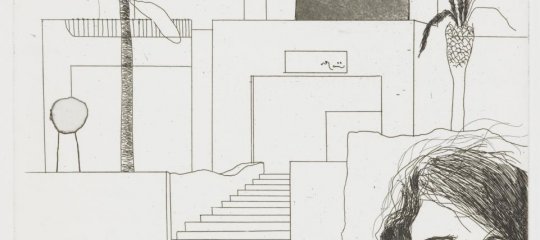Τρεις παραλλαγές σε ένα θέμα-Κυριακή Φραντζή
Η κα Φραντζή αποστέλλει τρία αποσπάσματα από λογοτεχνικά κείμενα. Μπορείτε να δείτε το υλικό και να προτείνετε τρόπους ή περιστάσεις αξιοποίησής του.
- Διακοπές χωρίς πτώμα
Μεγάλη
Παρασκευή στις έντεκα. Έσπαζαν
κιούπια. Η Κέρκυρα σύσσωμη. Μισοί στους δρόμους μισοί στα παράθυρα.
Γιορτή μετά την ανάσταση αλλά πριν λέγε
μου τι έγινε μια μέρα πριν μια πόλη σπαραγμένη σκισμένη από αμέτρητους
επιτάφιους που συναντιώνται χωρίζονται διασταυρώνονται φεύγουν ξανά για
διαφορετικές κατευθύνσεις αλλά και μπάντες κεριά λιβανιστήρια οι σχολικές
χορωδίες ένα μεσημέρι με τον αέρα της θάλασσας στα νεφρά στα μηνίγγια αδειασμένος κούφιος στους κροτάφους
σαν διάσχισμα ακρίδας ή ίσως θερμός και υπόκωφος αλλά ζωντανός γιατί ερχόταν
μέσα από φλέβες [...] ενώ αυτός δεν έχει φτάσει ακόμα και
ίσως να μην έρθει ποτέ αλλά έλα να δεις τον τελευταίο επιτάφιο έλα περνάνε για
τελευταία φορά επειδή μέσα στην οχλαγωγία και στις οδύνες ενός οποιουδήποτε
μπαρ το εκπληκτικό του σώμα επέβαλλε την αταραξία ξαφνικά η πόλη έπαψε να
καταστρέφεται και πόδια ζώα χέρια καμιόνια ταγιέρ πηλίκια ποδήλατα λαμπάδες
άρχισαν να έρχονται από τη θάλασσα συμμετέχοντας στη σιωπηλή ανασυγκρότηση με
τους αεροπρόσκοπους επικεφαλής και πάλι ξανά ξανά η ίδια ησυχία γιατί δε
σ’έβρισκα πουθενά μέχρι το βράδυ του Μεγάλου Σαββάτου
ανάσταση
πυροτεχνήματα ο σοβαρός και θλιμμένος κόσμος της Ορθοδοξίας
ΕΡΣΗ
ΣΩΤΗΡΟΠΟΥΛΟΥ
(απόσπασμα από το Διακοπές χωρίς πτώμα , 1997)
ΜΑΡΩ (χαρούμενη)΄Ηρθε, Αλέκα μου.Ήρθε!
ΑΛΕΚΑ
Ήρθε;
ΜΑΡΩ Ήρθε.
ΑΛΕΚΑ Ο Ξανθός;
ΜΑΡΩ Ήρθε, Αλέκα μου.Ήρθε! (Πέφτει
στην αγκαλιά της ΑΛΕΚΑΣ)
ΑΛΕΚΑ Θα
τρελαθώ... Πότε ήρθε;
ΜΑΡΩ Τ’απόγευμα.
ΑΛΕΚΑ
Τ’απόγευμα.
ΜΑΡΩ Ήμουνα έτοιμη να βγώ έξω. Να
πάω στο πρακτορείο για τα εισιτήρια... .
ΑΛΕΚΑ Αααα...τα ’βγαλες;
ΜΑΡΩ Δεν πρόλαβα.
ΑΛΕΚΑ Ευτυχώς! Ευτυχώς!
ΜΑΡΩ Έβαζα τα σκουλαρίκια μου να
φύγω και τον βλέπω μπροστά μου...
ΑΛΕΚΑ Ξαφνικά.
ΜΑΡΩ Ξαφνικά!
ΑΛΕΚΑ Αυτό
είναι.
ΜΑΡΩ Έβαζα τα σκουλαρίκια μου...
και κάνω ένα αααα!
ΑΛΕΚΑ Αυτά
συμβαίνουνε ξαφνικά .
ΜΑΡΩ Δηλαδή ένα λεπτό
αργότερα... πάει!
ΑΛΕΚΑ Παναγία μου!...[...] Και τι έγινε;
ΜΑΡΩ Δε θυμάμαι. Δε θυμάμαι
τίποτα.
ΑΛΕΚΑ Δε θυμάσαι;
ΜΑΡΩ Αν με ρωτήσεις να σου πω τι
έγινε από τη στιγμή που τον είδα μπροστά μου και μου λέει «πάμε
μια βόλτα», πώς έγινε, τι
έγινε..πότε κλείδωσα το εργαστήρι...
πώς βρέθηκα μέσα σ’ ένα τζιπ
και να τρέχουμε στην Εθνική Οδό
προς άγνωστη κατεύθυνση ...δεν κατάλαβα τίποτα...
ΑΛΕΚΑ Στην Εθνική Οδό;
ΜΑΡΩ Ούτε το κατάλαβα...
.
ΑΛΕΚΑ Έπαθες σοκ....
ΜΑΡΩ Έπαθα σοκ. Δεν ήταν
και λίγο...
ΑΛΕΚΑ Αστειεύεσαι; Έτσι, ξαφνικά....
ΜΑΡΩ Και πώς κατέληξα εγώ
ξαφνικά να βρεθώ στην Υλίκη- ούτε που το κατάλαβα
ΑΛΕΚΑ Στην Υλίκη; Ποιά Υλίκη;
ΜΑΡΩ Στη λίμνη.
.
ΑΛΕΚΑ Στη λίμνη; Εκεί που πίνουμε το
νερό;
ΜΑΡΩ Που πίνουμε το νερό.
ΑΛΕΚΑ Καλά εκεί δεν απαγορεύεται;
ΜΑΡΩ Αλέκα μου είναι
τρελός. Είναι υπέροχος!...
ΑΛΕΚΑ Και τι κάνατε στην Υλίκη;
ΜΑΡΩ Παιδί μου, εκεί που τρέχαμε στην Εθνική Οδό, ξαφνικά φρενάρει
το τζιπ και μου λέει
«κατέβα...». Του λέω «τι θα
κάνουμε εδώ;». Λέει «περίμενε»,
και βγάζει από το αυτοκίνητο
ένα
μεγάλο κουτί. Έτσι.. ένα μακρύ βαλιτσάκι μαύρο...το παίρνει μαζί του ...με πιάνει απ’ το
χέρι ...και λέει «πάμε»..
ΑΛΕΚΑ Λοιπόν;
ΜΑΡΩ Κατηφορίζουμε την πλαγιά... πηδάμε κάτι
συρματοπλέγματα και φτάνουμε κάτω
στη
λίμνη...Οπότε αυτός ανοίγει το κουτί ...πατάει ένα κουμπί ...και φσσσς
πετάγεται μια
βάρκα!...
ΑΛΕΚΑ Αααα!
ΜΑΡΩ Μια βάρκα κίτρινη φουσκωμένη... και μου λέει «έλα»...
ΑΛΕΚΑ Και δε φοβήθηκες;
ΜΑΡΩ Φοβήθηκα αλλά
δεν μπορούσα να του πω όχι...
ΑΛΕΚΑ Αυτό είναι το κακό με σένα.
Δεν μπορείς να πεις όχι. Δεν μπορείς να πεις όχι. (Ανάβει τσιγάρο)
ΔΗΜΗΤΡΗΣ ΚΕΧΑ΄Ι΄ΔΗΣ - ΕΛΕΝΗ ΧΑΒΙΑΡΑ
(απόσπασμα
από το θεατρικό έργο Με δύναμη από την Κηφισιά, 1996)
-Μίλα! ...
όπου αυτό είναι το μοναδικό
-Μίλα!
βράδυ
που περάσανε μαζί.
-Μίλα!
Δε θυμάμαι αν κοιμηθήκαμε.
-Μίλα!
-Μίλα! Γιατί δε μιλάς;
Αυτή είναι η μόνη στιγμή ηρεμίας που
-Μίλα!
ζουν
γιατί μετά απ’αυτό τα πράγματα
- Μίλα!
αρχίζουν να τους επιτίθενται ξανά.
-Μίλα! Μίλα!
- Μίλα!
Εκείνη τη στιγμή ΟΛΕΣ ΟΙ ΤΡΟΜΠΕΤΕΣ
- Μίλα!
ΤΟΥ
ΚΟΣΜΟΥ, ΓΥΑΛΙΣΜΕΝΕΣ,
- Μίλα! Δε με νοιάζει τι
ΑΣΤΡΑΦΤΕΡΕΣ,πρέπει να ηχήσουν και
θα
πεις, μίλα!
τίποτε άλλο να μην ακούγεται για λίγο
-Μίλα!
στον
κόσμο.
-Μίλα!
-Μίλα! Γιατί δε μιλάς;
Στη μεσαιωνική δύση το άτομο ανήκε
Μίλα!
καταρχήν στην οικογένεια. Ευρεία, πα-
-Μίλα!
τριαρχική οικογένεια. Υπό τη διεύθυνση
-Μίλα!
του αρχηγού της, η οικογένεια πνίγει
-Μίλα!
το άτομο, επιβάλλοντάς του συλλογική
-Μίλα! Δε με νοιάζει τι
ευθύνη και δράση.
θα πεις, μίλα!
-Mίλα!
-Μίλα!
On the first day of May I
took to the road
-Μίλα!
I’d been staring out of the window most
-Μίλα!
of
the morning
-Μίλα! Γιατί δε μιλάς!
I’d
watched the rain claw at the glass
-Μίλα! and a vicious wind blew hard and fast
-Μίλα!
As a warning
-Mίλα!
As a warning
-Μίλα! Γιατί δε μιλάς!
As a warning
......................................................................................................................
Τι έγινε και χωρίσατε;............................................................................................................................
...................................................................................................................................................................................
Και τώρα; Πού είναι ο άλλος;.....................................................................................................................
…………………………………………………………………………………......................................
ΜΙΧΑΗΛ ΜΑΡΜΑΡΙΝΟΣ
(από το πρόγραμμα του θεατρικού έργου Ρομέο
και Ιουλιέττα: Η
Τρίτη
μνήμη, που παίχτηκε φέτος στην
Αθήνα)
[ Οι ερωτήσεις στο τέλος ήταν στο περιθώριο. Όπως εξηγεί ο σκηνοθέτης για
ένα άλλο του έργο, μια διήγηση ξαναφτιάχνεται από ίχνη, ένα
γεγονός από τα
αντικείμενά του, ένα κείμενο από τις αποσπασματικές του σκηνές ]










